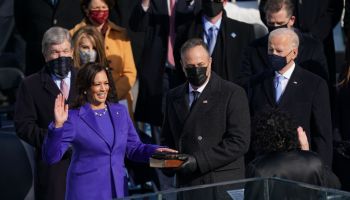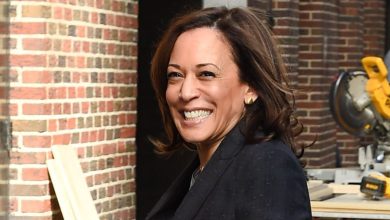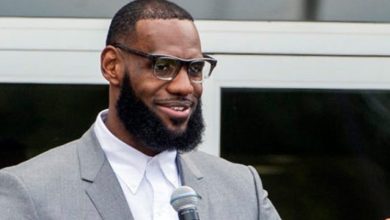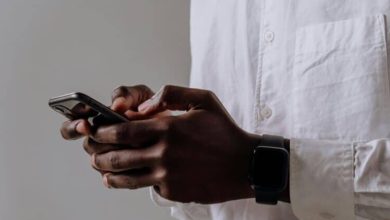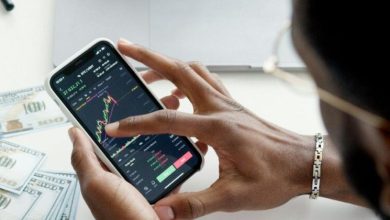Kamala Harris Has Lead Over Trump, New Poll Finds
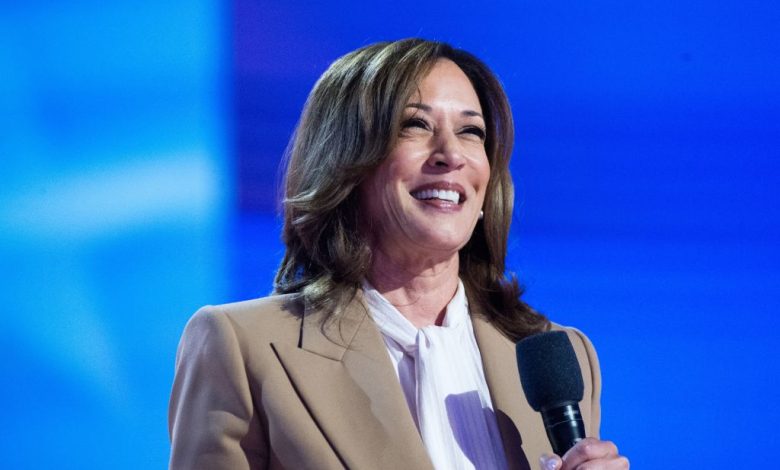

Source: Anadolu / Getty
Kamala Harris has a strong chance of beating out Donald Trump in November’s presidential election, according to new findings conducted by the Decision Desk HQ and other widely relied upon polling firms. There was a month-long pause on releasing updated data because of President Joe Biden’s withdrawal from the race on July 21. But with appropriate time now having passed, we are learning that Harris has a 56% chance of winning the presidency. Previously, the organization had predicted a 56% chance of a Trump victory over Biden.
Decision Desk’s analysis not only incorporates current polling data, but also fundraising and partisan leanings district by district. Key updates include North Carolina shifting from Lean Republican to Toss-up, and Michigan moving from Toss-up to Lean Democratic. Other swing states like Arizona, Georgia, Nevada, Pennsylvania, and Wisconsin remain Toss-ups, but Harris is performing better than Biden had been performing in them when he was still running.
Harris leads in general election polls–and there’s support growing in red states too
Decision Desk’s poll currently projects Trump with a 64% chance of winning North Carolina, with Harris having only a 36% chance of winning. But it also shows the state’s voters are beginning to lean toward Harris, narrowing the 10% gap Trump held in May. The last time a Democratic presidential candidate won North Carolina was Barack Obama in 2008. Additional polling showed other critical information too.
Harris is showing a strong lead overall according to a new USA Today/Suffolk University Poll published on Aug. 29. The 59-year-old Democrat has a five-point lead in the general elections over Trump (48% to 43%.) And, the poll noted, it was an especially significant jump from late June–an eight-point shift–in favor of Trump who then led President Joe Biden by nearly four points.
Harris’ lead is driven by significant gains among key Democratic demographics, including Hispanic, Black, and young voters. Notably, among those with annual incomes under $20,000, Harris has shifted from a three-point deficit to a 23-point lead over Trump. The poll surveyed 1,000 likely voters and has a margin of error of ±3.1 percentage points.
Harris’ potential presidency is historic for multiple reasons. If elected, she would be the first Black and South Asian president, symbolizing progress since the Civil Rights Movement, which saw African Americans denied basic rights, including the right to vote. At the DNC Convention earlier this month, the vice president’s sister, Maya Harris, emphasized that Harris would champion the marginalized if she were to lead the White House. It’s a promise consistent with the goals and actions of the former California senator. Additionally, as Republicans have undermined reproductive and other forms of healthcare in more than two dozen states–which disproportionately harms Black women–Harris has been stalwart in her mission to protect women’s healthcare through legislative action.
Her message of equality seems to be striking a chord, even in traditionally conservative states. In November, voters in Arizona and Montana will have the chance to decide whether to enshrine the right to an abortion in their state constitutions. The Arizona Supreme Court recently upheld the validity of a 200-word summary used by abortion rights advocates to collect signatures for this ballot measure, ensuring it will appear on the ballot. The Arizona Secretary of State’s office confirmed that 577,971 signatures were certified, exceeding the required threshold. This development reflects a growing momentum for reproductive rights in these red states.

Source: Brian van der Brug / Getty
It began with a few Black women on what began as a normal Sunday but ended as an historic one
Polls suggest that America is poised to support Kamala Harris. Her candidacy for the Democratic nomination gained significant momentum soon after Biden endorsed her for president, and she rose to the challenge on Sunday afternoon, July 21. Within roughly an hour, Black women leaders including Donna Brazile, Melanie Campbell and Ohio Congresswoman Joyce Beatty, asked 1,000 Black women across the country to jump on a Zoom call to begin to strategize that very evening.
By the time the hour of the Zoom call arrived–8:30 p.m., Eastern–more than 25,000 thousand African American women showed up. There was a fast shift to other platforms in order to accommodate everyone, and by the time the call concluded nearly three hours later, the number of Black women who gathered had grown to 44,000.
The next night, a similar call for Black men was announced and hosted by Roland Martin and attracted at least 40,000 participants. Speakers including Gov. Wes Moore, Benjamin Crump, Marc Morial, and NAACP President Derrick Johnson emphasized the crucial importance of every vote. Together, both groups raised more than $2 million for the Harris campaign and led the way for the historic fundraising support of $250 million in two days.
Within 24 hours of Biden’s exit from the race, Harris’ campaign alone received over $81 million in contributions, surpassing the $50 million Trump raised in the two-month period between his 34-count felony conviction in New York in May and July 23. And for his campaign, the news continued to get worse. White women for Harris jumped on a call, then white “dudes” for Harris jumped on call, and they were followed by other demo-specific voter calls.
All of them had a singular goal: to ensure the vice president’s nomination as well as the funds needed to successfully do in three-and-a-half months what Trump had been doing for three years.
SEE MORE:
How Kamala Harris Is Inspiring Young Black Voters In Texas
